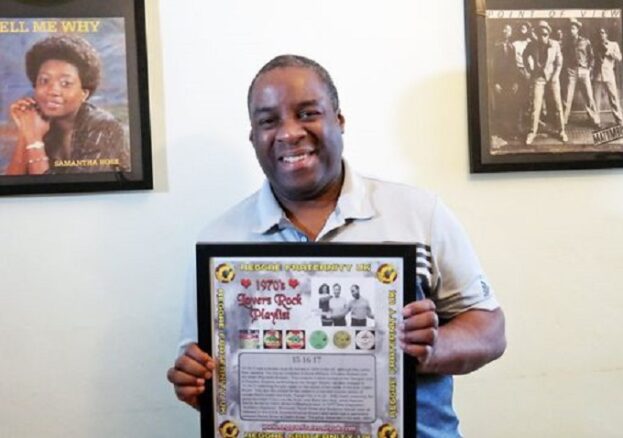
The 1970’s Lovers Rock Exhibition is curated by CeeBee Multimedia a.k.a Colin Brown, a reggae radio presenter and key supporter of the annual International Reggae Day UK celebrations. The exhibition takes place at the Theorem Music Village, formerly BBMC Rehearsal Studios, where numerous Jamaican and UK reggae artists have rehearsed and recorded. The exhibition, which marks African History Month, starts with an invitation-only press and industry preview on October 24. There’s free access to the general public from October 25-30.
Brown, who has tapped into reggae history experts and industry practitioners to unearth artefacts and to corroborate the veracity of the information presented, aims to “establish the chronology of when UK-based reggae artists and bands released their first Lovers Rock record”. He also highlights artists and producers who have often been overlooked, as well as revealing the work of Jamaican producers, arrangers artists and musicians who contributed to records seen as British products.
The exhibition charts the evolution from a Jamaican sound to a distinctively British sound, from romantic reggae to UK lovers’ rock. It also celebrates a major milestone – 50 years of lovers’ rock in the UK, from 1972 to 2022.
1972? I hear some of the readers ask. Before dealing with this matter, let’s also look at another area of confusion – the spelling of this reggae genre. Lovers rock, lover’s rock, or lovers’ rock – there’s no agreed standardised spelling. It’s generally believed the genre got its name from the Lover’s Rock label, just like a decade earlier ska in the UK got named Blue Beat, after the label that released so many ska records.
What is not in dispute is that Harris’ Lover’s Rock label released a lot of romantic reggae singles in 1977/78 by the likes of Brown Sugar, TT Ross, Cassandra, and Winston Groovy, which caused similar UK-produced records to be lumped under lovers rock.
In that case, the spelling should follow what was used on Dennis Harris’ south London label – Lover’s Rock. But one’s not going to be pedantic here. After all, one can also make a grammatical case for lovers’ rock, for example.
Regarding what the genre is, this line from Wikipedia pretty much crystallises the prevalent view: “Lovers’ rock is a style of reggae music noted for its romantic sound and content. While love songs had been an important part of reggae since the late 1960s, the style was given a greater focus and a name in London in the mid-1970s.” The pertinent fact worth noting in this definition is the “romantic sound” or what others used to call “romantic reggae”, before the lovers rock term was coined. So you can understand why veteran record producer Clem Bushay asserted on the International Reggae Day London, UK Zoom 2020 meeting that 1972 is the year to locate the start of the UK-produced romantic reggae, which became known as lovers rock.
Because what came to be called lovers rock later in the 1970s, did not differ stylistically from Bushay’s 1972 production of Domino Johnson’s ‘Summer Time’, or other 1972 releases, such as Ginger Williams’ ‘I Can’t Resist Your Tenderness’ or Winston Reedy’s ‘Breakfast In Bed’. Whilst Brown has delved into several books, bought numerous hard to find records, interviewed key people who were active in the music industry in the 1970s, in order to curate the first exhibition to focus on the history of 1970s lovers rock, he’s open to discussions to make sure the history is correctly represented.
With this in mind, BBM/BMC (BritishBlackMusic.com/Black Music Congress) has created a free Zoom meeting, The Lovers Rock Forum on October 19, where Brown and the author will lead a discussion on “1970s lovers rock history and clarifying some of the inconsistencies and controversies, ahead of the BBMC exhibition.”It aims to be an enlightening and eye-and-ear-opening discussion, which offers an opportunity to (re-)discover or confirm the facts about 1970s lovers’ rock.
The 1970’s Lovers Rock Exhibition
25 October 2022 to 30 October 2022
